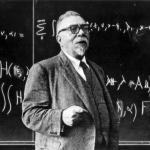Why Trade Unions Should Fund Automation

"I would give a guess that a critical situation is bound to arise under any condition in some ten to twenty years; but that if war should make the replacement of labor mobilized into the services an immediate necessity, we should probably have a concentrated effort put into this work which might well lead to large scale industrial unemployment within two years.I do not wish personally to be responsible for any such state of affairs. I have, therefore, turned down unconditionally the request of the industrial company which has tried to consult me [he had been asked by a corporation to help automate jobs]. However, it is manifestly not enough to take a negative attitude on this. If I do not put this information in the hands of the industrialists, it is merely a question of time when so obvious a method of procedure will be urged upon them by other people."
"What I am proposing is this. First, that you show a sufficient interest in the very pressing menace of the large-scale replacement of labor by machine on the level not of energy, but of judgment, to be willing to formulate a policy towards this problem. In particular, I do not think it would be at all foolish for you to steal a march upon the existing industrial corporations in this matter; and while taking a part in production of such machines to secure the profits in them to an organization dedicated to the benefit of labor. It may be on the other hand, that you think the complete suppresion (sic) of these ideas is in order. In either case, I am willing to back you loyally, and without any demand or request for personal returns in what I consider will be a matter of public policy. I wish to warn you, however, that my own passiveness in this matter will not, on the face of it, produce a passiveness in other people who may come by the same ideas, and that these ideas are very much in the air."
And although evidence has come out that automation has not been the only cause for loss of employment in traditional union bastions, outsourcing or a "spatial fix" in the words of Beverly J. Silver, also contributed greatly (maybe more than mainstream economists want to admit). Nevertheless automation has had a negative effect on union strength throughout the western world.
Today we are probably at the edge of a new wave of automation, driven by new technologies such as AI. And even though I think effects have been mischaracterised (read my recent piece in New Socialist about it!), this new wave can most certainly be targeted towards remaining union strongholds and ascending sectors of workers who are organising.
So what are we to do? "Stealing a march" on existing capitalism might not be a bad idea. Not necessarily by organising a robot tax, as Wiener seems to suggest, but by steering the direction of automation for ourselves.
In the last newsletter I interviewed Adrian Smith of Sussex University about automation, here's a quote that particularly inspired me:
"So, it seems strange to me just how much automation policy focuses on the ‘impact’ technology will have on jobs and society, as if particular technological futures were an unavoidable force of nature. That way of looking at technology suits the interests of incumbent developers, and unduly privileges the trajectories of development that they want to make happen. If you look carefully at groups working in open hardware networks and makerspaces for example, you’ll see they are subverting, adapting and appropriating many of the technological ingredients of ‘automation’ - computation, sensors, actuators, computer numerically controlled machine tools, design software, microelectronics, internet platforms, 3D scanners/printers, video, etc. But the technologies are being taken in directions and used for purposes quite different to industrial automation. They’re working along technological trajectories inspired by social visions quite different to the ‘cyber-physical systems’ of Industry 4.0 advocates. Instead, activists are pursuing ideas for commons-based peer-production, knowledge as commons, free culture, solidarity economy and commitments to social values like sustainable development."
Automation is not simply a process that is apolitical and rolls over us like a wave, rather it's human driven process that reflects the biases of the developers and designers that make the systems. And more importantly, it's driven by the preferences of the capitalist businesses and investors bringing this technology to market.
So why shouldn't the union movement, impacted as it is by automation, do the same with it's still significant capital reserves? Why does, for example, Airbus fund academic chairs in the digitisation of manufacturing, but don't trade unions fund similar research into human-oriented uses of automated technology? Why don't trade unions work with hackerspaces to design and test devices that could improve the working lives of their members? Why don't they steer the target of technological research away from profit and towards human gain?
Of course this might easier said than done. Developing the capacities to steer technological research and development are hard, and certainly cannot be taken for granted. If we, however, want to take control over the direction technology takes, changes need to take place in who funds its development and what priorities are made. Trade unions, inherently rooted in our workplaces, occupy a great space to do this.
Also feel free to share and subscribe to the newsletter, which you can do at the this link.
